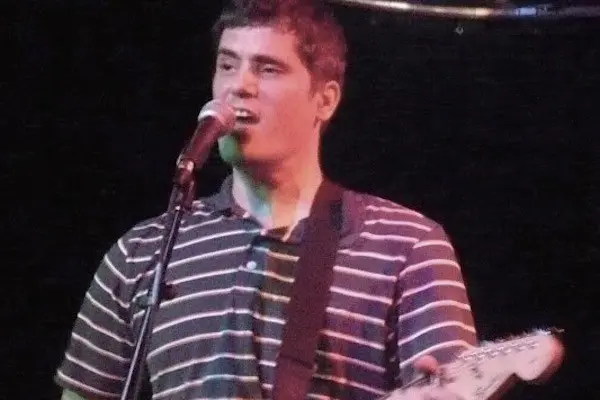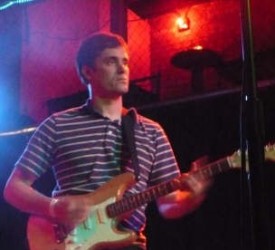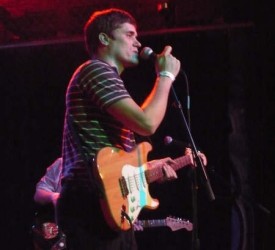
Jesse Michaels: the man, the myth, the legend. A man? Well, that's a given. The myth? Quite a few surround his whereabouts and doings during hiatuses over the course of his 20 year career. A legend? Most certainly. And while most are quick to remember him as the front man of the widely influential Operation Ivy, Jesse has amassed a healthy body of work with other projects over the years (including Big Rig, Common Rider, and occasional acoustic work).
But, to let Jesse tell it, he's always been more of an everyday man than a legend. On a recent tour date with his latest project (Classics of Love) Punknews.org's own journalistic miscreant Dorian "Big D" Wolak found that out firsthand and took the opportunity given to dispel some of the rumors.
Sometimes interviews leave me (Dorian Wolak) feeling flat out disappointed. I meet someone who I've held in the highest regards for what seems like forever only to find they just can't live up to those expectations that I've built around them . Over the years, I've seen some of my heroes reduced to assholes, "rock stars", drunks, addicts, rich guys and out-right idiots. With each one of those interviews, a little piece of my adolescent "punk rock" naiveté slips away.
But not all interviews are so discouraging; more often than not I come away with at least a little something that is somewhat intriguing. And every so often I'm treated to a conversation w/ one of those childhood heroes who are exactly how my mind's eye perceived them to be. Jesse Michaels is one of the latter. After catching his latest musical endeavor (Classics of Love) recently, I decided to press my luck and ask for an unscheduled interview. To my surprise he took me up on the offer. And although the interview was brief, I went home that night feeling vindicated in not only my investment in Jesse and his music, but vindicated in my devotion to punk rock as a whole. Here's how the interview went.
A lot of kids wake up one morning and decide "Hey, Iâm going to be a rock star" which I realize you tend to shy away from the whole "rock star" image and mentality but, how and when did you decide you were going to pursue a career in music?
Well, Iâve never really pursued a career as a professional musician. Iâve just sort of played music because I enjoyed it. Most of the time when I played there was very little possibility of making any money; and still, itâs not really likely to make any money today. So itâs something I do out of love, and if success comes thatâs great. If not, no regrets because I enjoy it.
 But how and when did you get into music?
But how and when did you get into music?
When did I decide I wanted to start playing? Iâve really always loved music. Even before I was in a band I used to pretend I was a singer for a band, you know like listening to other records and I would pretend I was a singer, just as a little kid; like 11-12 years old. Very young I had the urge, even though it wasnât defined in any way. As soon as I got the opportunity to actually play with other people I did it. And you know it was great. And thatâs the cool thing about punk, thereâs less limitations in terms of how much you actually have to know how to play, you know the "anyone can do it" thing applied. So, I was able to do it because of that.
Some consider Berkley, California circa 1985-1989 to be the pinnacle of Americaâs punk rock revolution or a punk rock wonderland (if you will). Can you paint us a picture of that environment?
When I was started getting into punk in Berkley things were actually dying out. Before I was involved with Berkley punk, there was a huge hardcore scene (in the original sense of the word); bands like Government Issue, Bad Brains, early Agnostic Front and Negative Approach. That scene was kind of dying down and there was a little bit of a void there. So actually, when I was into it things weâre a little bit dead and they picked up with the local bands. So, the best way to describe it was just a bunch of kids playing music and having fun. It never seemed very epic it, just seemed like garage stuff⦠garage kicks you might say.
Looking back, does it surprise you in regards to how much attention that scene has garnered over the years?
It has surprised me; but, it doesnât surprise me anymore because I know different things mean different things to different people. For me, the scene that really seems legendary is the late 70âs punk scene. Bands like The Weirdos, The Dils and stuff like that. But everybody has their own thing that they refer to which means a lot to them. Iâm just glad to be a part of the wholeâ¦..process, I guess.
Your lyrics have always been socially and politically motivated. What molded or formed your social/political sensibilities?
Well, I grew up in Berkley and am basically left leaning, although I donât agree with everything about left-wing politics. I basically believe in human rights and social justice, but Iâm not really political. Iâm mainly into art. My personality is that much more of an artist than a political person. Itâs just that politics have a spirit of truth in them or saying something about the world has the spirit of truth in it and that makes for good art. Or you know, in more down to earth terms; it makes for good rock nâ roll. So, thatâs just the best source for me to write good songs. And not all the songs are politically based but I find a spirit of truth in that subject matter.
How do you approach song writing? Do you carry a pen and pad around 24/7 or actually sit down with the intent to write a songâ¦â¦?
I usually start with a guitar riff and then build lyrics on top of that. So you get a groove that doesnât necessarily have ⦠itâs not mental yet. And once you have the groove or the feeling, it builds from the feeling rather than a mental idea. So itâs a very instinctual process and itâs very natural. Then once youâve got a good riff and good little vocal pattern, then the wordsâ¦. I struggle for days and days and days to get the right words to it. Itâs a lot of work; I mean hours and hours of work. But, when it pays off (like when you get a good song), itâs a great feeling so itâs worth it.
In the past, the music surrounding your lyrics has often been reggae/ska inspired. Iâm interested to know where you came into contact with reggae/ska initially and who you hold as influences and possibly inspirations.
Definitely The Specials, when I was growing up I was listening to punk records but I was also listening to The Specials and English Beat and also a local band called The Uptones. They were from Berkley and were one of the first two-tone ska bands in America. People stage dived at their shows, I mean they were wild. And all of us in Op Ivy grew up seeing them, so they were a huge influence and they were definitely our predecessors. In fact, Rancid even covered an Uptones song.
Oh yeah, which one?
"Get Outta My Way", I believe it was on their first self-titled album.
Being that Op Ivy is widely regarded as one of the innovators of the ska-core sound that enveloped the 90âs, I always wondered about your opinion about that trend. Did you take it as a compliment or did you feel like a plagiarized artist?
No. not at all. I mean I didnât feel we were plagiarized at all. I feel like we were at the right place at the right time. That whole thing that took place is much bigger than anything we did and it took on a life of its own. I just feel like I did my part in it and I take my hands off of it. I donât really feel like a predecessor. More like just sort of a link in a long chain. You know the Clash and the Uptones were doing it before us. There was a Spanish band that was doing it before us called Kortatu. Overall, I think itâs a cool thing. Itâs really fun and young kids tend to like it. Thatâs cool you know. Iâm not all that familiar with most of the bands but I dug Suicide Machines, Against All Authority and Leftover Crack is pretty raw. So from what Iâve heard, thereâs some good stuff out there and Iâm happy to be a part of it.
Youâre back with your new band Classics of Love, which is a relatively new endeavor. For the unfamiliar world, can you give us some insight into the band?
Weâve been playing together for about six months. Mike Park hooked us up, basically. I was doing solo stuff and I was talking to Mike and he was helping me record some demos and then I just asked him "do you know anyone who might want to play?" and he hooked me up with these guys The Hard Girls, which is the band I now play with. You know, they have their own band called The Hard Girls also.
How would you describe the sound of Classics of love? Is it stylistically similar to Common Rider or Op Ivy?
Itâs hard to define exactly because I really do it song by song and the songs are somewhat different from one another. But I would call it melodic punk rock with rock nâ roll influences and thoughtful lyrics. I put a lot of effort into the lyrics and try to give them meaning; whether or not thatâs successful who ever listens to them can be the judge.
 I know you cited one of the reasons for the demise of Common Rider as geographical constraints; I take it the members of Classics of Love are all relatively local to each other?
I know you cited one of the reasons for the demise of Common Rider as geographical constraints; I take it the members of Classics of Love are all relatively local to each other?
Yeah. Itâs really hard to find the perfect set up. There are always problems in bands. There are personalities, you often have drug and alcohol problems, you often have flake problems, you often have geography problems. You know itâs difficult to get 4 people together (especially 4 young men, because young men are usually a big pain in the ass). But this time around I met some people who were local and thatâs part of the reason Iâve really jumped into it, because it seems like a pretty solid set up.
After Op Ivy split up there was an extended hiatus before fans reconnected w/ Common Rider, instigating rumors that you had died, became a monk, a Mexican wrestler, etc. What were you up to in those days?
At times I was going to school, I did study Buddhism for a while but I wasnât really a monk. There was a lot of fucking up and drinking and stuff. I wasted a lot of years doing that; I wouldnât say wasted because I donât regret it, I learned from it. But a lot of bullshit, just this and that and living life. I just wasnât doing music; I didnât feel like it for some reason. I donât even know why I didnât. Life has cycles, you do nothing for a while and then you get active and right now Iâm active.
Youâve had successful jaunts in two highly influential bands, and to a certain extent itâs almost like youâre starting over again, what keeps you coming back to the table?
Well, in a way the thing I wonder is what kept me away from the table. Like, why didnât I just do it? But I didnât, I just didnât feel it. But now I do. And basically what keeps me coming back is I just enjoy it. I love it. And also, the opportunity to just enjoy it, you know? Right now Iâm playing with people with good instincts and that are nice to play with. So that makes it really fun.
I read in an interview where you said you once waited outside a venue for two hours to meet Joe Strummer, how do you feel about the same attention being bestowed upon yourself by adoring fans?
Well, I try not to think about it in terms of attention or in terms of adulation or like being in a position higher than someone in the audience. The reason I donât think that way is because it makes me fucking nuts. So if someone comes up to me and tells me they like the music or that it meant something to them I just listen to what they have to say and Iâm grateful for it. But, I never think of myself in the third person, if you see what Iâm saying. Thatâs when you start tripping and itâs not healthy. Iâm just trying to stay down to earth.
Back in the '80s, America electing a black man as president was unfathomable, now itâs become a reality. What is your reaction to the air of social change that we find ourselves in these days?
In America the government is based on, and this may seem simplistic, but the rich get richer and the poor get poorer. Having a black president doesnât really change that. But, at the same time I think heâs doing good things. To me itâs not so much that heâs black, although thatâs wonderful and it represents a big change. I donât think that could have happened in 1990, much less 1980 or 1970. What I do think is good is that heâs doing some good things, regardless whether he is white or black or whatever. You know he released the "torture memos", that was courageous. And heâs done other things where he has taken risks. I donât think heâs perfect. I donât think having a good looking and articulate president is really going to change the status quo or the billionaires having way too much influence on things. But at the same time I voted for him and I think heâs doing some good things.
Along the same lines of social change, whatâs your take on the gay marriage debate? Iâm for it. I have a lot of gay friends and to me itâs like the only person who could possibly object to that would be a person who is religious. Iâve never met a person who has objected to it on a nonreligious basis. I have a lot more problems with conservative religion than I do with anyoneâs sexual choices. I donât want to say anything against Christians or any other group but basically I think the institution of marriage based on a bible scripture written by someone who never even met Jesus is incorrect. I think itâs a misreading of the very scriptures that they adhere to. And even though itâs predominantly a Christian thing (to be against gay marriage), I have nothing against Christians. But, Jesus never talked about it and I donât think St. Paul is the same thing as Jesus. I donât want to get into a religious discussion, but to me the argument against gay marriage is ridiculous.
Letâs lighten things up a bit before we end this thing: Howâs about one thing most people donât know about you?
Iâm really into metal. Some of my favorite bands are High on Fire, Black Sabbath and I dig Slayer… At the Gates⦠so I dig metal, thatâs one little thing.
I never wouldâve guessed. Punkers tend to get banged up for one reason or another over the years, what is your most gnarly scar and whatâs the story behind it?
Letâs seeâ¦.. Whatâs my most gnarly scar that I can talk about publicly? Right now, Iâd say my gnarliest scars consist of burns all over my arms from being a cook. Right now theyâre starting to fade because Iâm on tour, which is like a vacation; but normally Iâm all burned up.
Is that what pays the bills?
Jesse: Yeah, Thatâs my 9 to 5. I cook breakfast 4 days a week and dinner 1 day a week. I would cook dinner more because itâs much more interesting but I have to practice you know. â¦gotta go to band practice.
When you say breakfast you mean like bacon and eggs and that sort of thing?
Jesse: Bacon, eggs, potatoes, breakfast burritos, the standard breakfast. So that also might qualify as something people might not know. I know much more than any person should know about eggs.
I have an Op Ivy tattoo, Iâm just wondering if you have a "Big D" logo tattooed on you?
Yeah, I do but I canât show it to you itâs in a weird place.
Whoa! I knew it!
No, Iâm just kidding.
You can find Classics of Love here: http://www.myspace.com/classicsofloveband